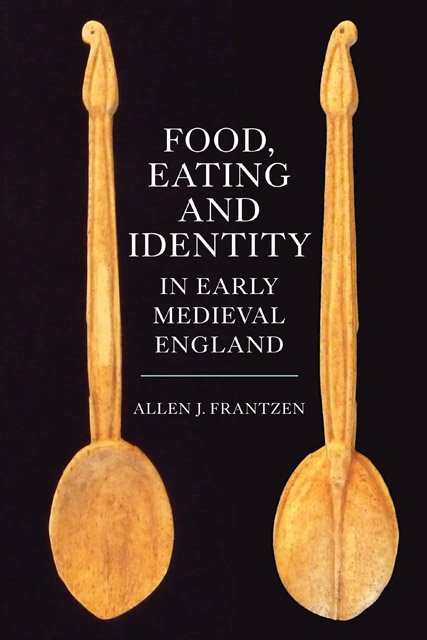8 - Food Officers in Handbooks of Penance
Published online by Cambridge University Press: 14 February 2023
Summary
Objects communicate the presence and identity of those who use them. Knives, hooks, bowls, and cups served as badges of identity among the Anglo-Saxons, just as objects today are one way we show others how we see ourselves. Many people who worked with food are identified in Old English sources, including the beekeeper, the cheesemaker, and others. Some food workers also acquired identities as food officers, the term I use for those who monitored supplies to last through the winter; managed the diet during fasting periods; and, when necessary, assessed the quality and acceptability of the food and drink. When food workers exercised this authority, which they did only on occasion, they changed the way other people saw them. They acquired a temporary identity – what I have described earlier as a “situational” identity – in addition to what William O. Frazer calls the “social identity” that was ordinarily theirs.
The role of food officer is one of the less conspicuous ways in which food culture generated identities that formed the “storied lives” of the Anglo-Saxons. A settlement’s beekeeper became a food officer when someone was stung by bees and died as a result. Two Old English penitentials refer to this case. On such an occasion, the bees were to be killed, although the honey they had produced could be consumed. The beekeeper was presumably responsible for killing the bees and preserving the honey. This was not a routine event, and the case is not mentioned among the beekeeper’s duties in the Rectitudines Personarum Singularum, the Rights (or Duties) of Individuals. The beekeeper’s actions certified the purity of the honey, a valuable sweetener, and ensured access to it. In this case his authority and expertise also gave him, temporarily (and unusually), even more: the authority to execute symbolic justice, since life had to be given to pay for life taken.
The most prominent food officers mentioned in Old English ecclesiastical texts were bishops and priests; in the laws, the most important food officers were reeves. In the next chapter I examine food purity and food officers in the law codes and related texts. Here I describe food purity and food offices, show how handbooks of penance treated these food-related identities, and then consider what various categories of food purity would have meant for food officers, cooks in particular.
- Type
- Chapter
- Information
- Food, Eating and Identity in Early Medieval England , pp. 177 - 205Publisher: Boydell & BrewerPrint publication year: 2014

